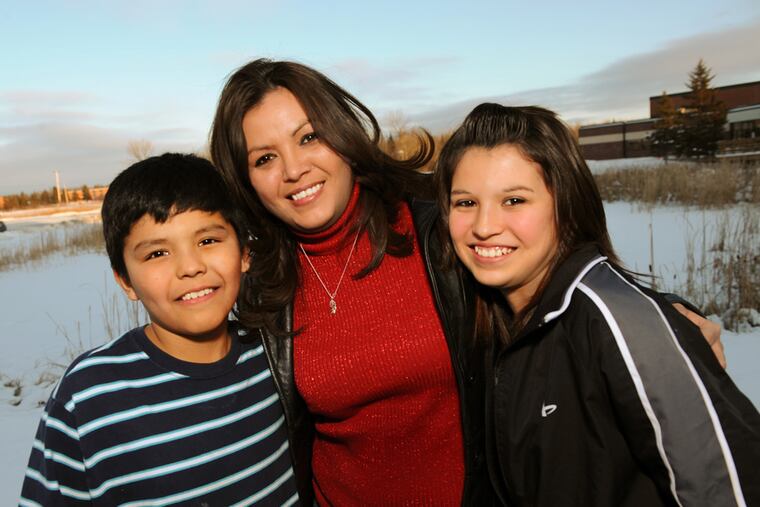
* KIND HEARTED WOMAN.9 p.m. Monday and Tuesday, WHYY 12.
"I DON'T remember the first time I got raped," says Robin Poor Bear, the subject of filmmaker David Sutherland's "Kind Hearted Woman," in Monday's PBS premiere. "But I remember the emergency room after the rape."
After she was put into foster care as a young child, her foster father and two of her foster brothers "raped and molested me throughout my childhood."
In almost any other TV setting, this would be the Big Moment, the catharsis that allows viewers to feel . . . what? - sympathy? Recognition? Gratitude that it's not them? - before moving on to some other sad story or fleeting moment of intimacy with a televised stranger.
But "Kind Hearted Woman," a five-hour presentation of "Frontline" and "Independent Lens" that will air over two nights, refuses to walk away from what, it turns out, is only the beginning of Robin's story.
(At the time of the filming, Poor Bear, a member of the Oglala Sioux's Spirit Lake Nation, was using her married name, Charboneau. She's since changed to her mother's surname. The title of the film is a translation of her Indian name.)
Things get worse before they get better for Robin over the several years covered by "Kind Hearted Woman." A divorced mother of two and a recovering alcoholic, she may finally be willing to speak out about the abuse she suffered as a child, but that doesn't mean that she's not still experiencing its effects in every aspect of her life.
When her daughter, Darian, also becomes a victim, Robin becomes enmeshed in a lengthy struggle with the tribe's social services and legal system, and filmmaker Sutherland - and his cameras - are there for every frustrating twist and turn.
As compelling as it is occasionally claustrophobic, a film like "Kind Hearted Woman" comes around only once every several years, mostly because that's how long it takes Sutherland to make them.
Best known for his previous "Frontline" films, "The Farmer's Wife" (1998) and "Country Boys" (2006), the sixtysomething filmmaker spends years with his subjects.
Asked, during a PBS news conference in January, just how long he'd worked on "Kind Hearted Woman," he was, characteristically, a little vague.
"Oh, well, the whole process, I don't know," he said. "I think I've known now about six years. It's a long time. I hate to say it. 'Country Boys' took seven years. You know, these last three films, it's 20 years older. I'm an old man now. And I'm not being flip. I'm dead serious."
While making "The Farmer's Wife," he said, some of the locals "used to refer to us as the idiots . . . because you come in, and it's five years later - the film still isn't on TV and not done. So it's not like a lot of shows that go on TV."
No, it's not.
Over the past decade, television's voracious appetite for so-called real people may have given us the illusion that we're getting to know strangers. But whether they're artficially ensconced in "The Bachelor" mansion or "Big Brother" ant farm, or filmed in situ for shows like "Here Comes Honey Boo Boo" and "Sister Wives," they're almost invariably presented as characters, edited to fit someone's notion of entertainment.
Sutherland's subjects aren't so easily pigeonholed. Like the people in our actual lives, they can seem frustratingly obtuse at times - but can't be dismissed with some rose ceremony or contrived happy ending.
They're also people for whom money can't help but be an object.
"In 'The Farmer's Wife,' I wanted to put a face on a farm family that was struggling in the '90s, and 'Country Boys,' kids growing up in Appalachia," Sutherland said.
For this film, "I wanted to deal with someone that had been abused, because I had missed it in my last two films. It was in the backdrop in 'The Farmer's Wife' and 'Country Boys.' It just wasn't there when I was filming."
He was less interested, initially, in focusing on a Native American family, concerned that as a white man he might be seen as perpetuating stereotypes. "I just wanted you to get to know up close. That's all I'm ever going after," he said.
"It takes me a long time to find people. With 'The Farmer's Wife,' I lived with 52 farm families for a minimum of four or five days over two and a half years. And in this, I interviewed a lot of Native women. And to be honest, I was very afraid of Robin when I first met her. She's the last person I was ever going to do. She read me one of her poems. And then as time went and I looked around, she once told me she thought that was the reason that she might have gone through all this stuff. Maybe it would be good to be in a film."
For Robin, who allowed her son and daughter to remain on camera during some very tough moments - scenes about which I can't help but have mixed feelings - speaking up is about something more than becoming famous.
"David was the third person I had ever told about what I endured as a child," she told reporters. "I've always taught my kids that if they have something to say, say it. If they have something that they think they need to share, then it needs to be shared, and that their voices are powerful."
On Twitter: @elgray
Blog: EllenGray.tv